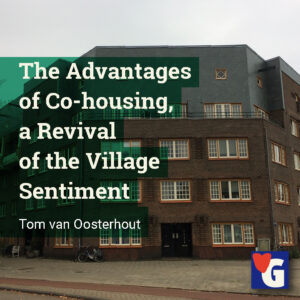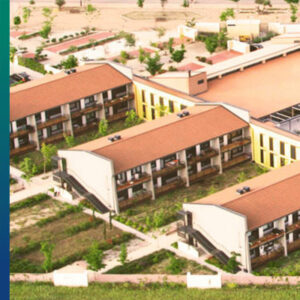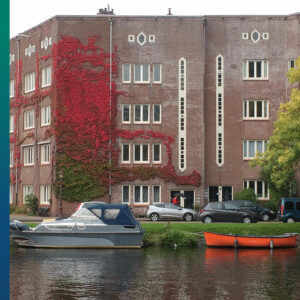
In Amsterdam, there are at least 20 co-housing projects. Most of these projects are established by older people. But what is co-housing, what are the advantages, and how do you start and maintain a co-housing project?
From the outset, any co-housing project involves a community of people. These people deliberately choose to invest in each other. Moreover, most co-housing projects contribute to the local community, to education, and to the environment.
To live up to these ideals they organize all sorts of activities, for those that live in the project as well as for outsiders.
Some of the links might be affiliate links. As an affiliate associate, we earn a small commission when you purchase any of the products offered through the shared links at no extra cost for you. This helps us to maintain this website.
Table of contents
- 1 Co-housing, a revival of the village sentiment
- 2 Trabensol, the first senior co-housing project in Spain
- 3 Co-housing, a close social community
- 4 Co-housing requires an early start
- 5 The legal foundation of co-housing
- 6 Required are charismatic initiators with endurance
- 7 Different motives, different effort
- 8 Co-housing requires a Sense-of-Community-Care
Co-housing, a revival of the village sentiment
Co-housing is a planned, social community project requiring a great deal of brainpower, a clear legal foundation, charismatic initiators, a cooperative attitude, and a lot of endurance.
Trabensol, the first senior co-housing project in Spain

The first senior co-housing project in Spain, Trabensol, is a fine example of a community with a broad set of principles. ‘Sostenibilidad’ – sustainability – is one of their guiding principles. Trabensol is situated in a small village north of the city of Madrid.
Trabensol is a cooperative and originated in 2001. The main purpose of the participants is to give elderly people, with a need for an active and social life, the opportunity to live together.
However, who wants to start a co-housing project and why and when? Frequently, co-housing involves people who are in their fifties and sixties. They ponder about retirement and want to live in social communities with closer ties.
In Amsterdam, here in Spain, and in other countries, people want to revive the ideal of the small villages where they were born and raised. The first project of this type in Amsterdam is called City-Village-South. An initiative that originated by studying the Village-to-Village Network in the USA and the Seniorengenossenschaften in Germany.
Co-housing requires an early start
Essentially, the principles of Trabensol in Spain and City-Village-South in Amsterdam, are very much alike. The big difference is that the Trabensol initiative includes the construction of a brand new apartment complex.
In the city of Amsterdam, there’s hardly any affordable space for new buildings. Nevertheless from the original idea to the legal foundation, it took both cooperatives over 5 years to get started. That is why it’s so important to finalize the legal foundation of the cooperative as soon as possible.
The legal foundation of co-housing

The legal foundation of the cooperative must at least include:
- The guiding principles (co-housing, sustainability, generation friendly, socially anchored in the neighbourhood etc.);
- Who is allowed to participate (age, must endorse the guiding principles etc.);
- The procedures to enter into the cooperative;
- The duties and rights of the participants;
- The organization of the decision making;
- The settlement of conflicts between participants;
- The organizational components of the cooperative and their competencies;
- The financing of the cooperative and the design of the financial organization (handling of gains and losses, the financial reserves, accountancy etc.);
- The practical rules and procedures to deal with participants who do not abide by the legal foundations.
Related: Why Giving is our most Fundamental Human Motive
Required are charismatic initiators with endurance
Furthermore, a legal foundation is hardly enough to call a co-housing project a community. The participants have to organize practical (social) activities.

To reach the actual operational status is far more difficult if it includes the construction of a brand new apartment building. That is why, the more complex and vast a co-housing project is, the more it requires charismatic initiators with an awful lot of endurance.
Different motives, different effort
Extensively, frequently and intensively, I interviewed, from 2010 to 2012, the participants of the Amsterdam cooperative City-Village-South. All participants were strongly committed to their initiative.
Although they shared a variety of motives, the most frequently mentioned are: to strengthen social ties, reciprocity (to help someone in return for help when needed), and access to practical information and support. Those that want to strengthen social ties also want to invest their time and energy in the operational activities of the cooperative.
Co-housing requires a Sense-of-Community-Care
I define the ‘state of mind’ of these ‘social’ participants as a specific ‘sense-of-care’, a Sense of Community Care. These participants manage the cooperative. At the same time, they render all kinds of practical services to their co-participants.
These ‘social’ participants are very aware of their Sense of Community Care. That is why this is the most essential quality of participants of a cooperative. The more participants with a Sense-of Community-Care, the more successful the cooperative.
Do you know any co-housing projects or do you live in one? Tell us in the comment box below.

